|
|
|
|
|
|
|
|
|
|
|
|
|
|
|
|
|
|
|
|
|
|
|
|
|
|
The City of Fort Scott Administrative Offices will be closed on Monday, September 5th, 2022 in observance of the Labor Day holiday. The offices will reopen on Tuesday, September 6th, 2022.
The City’s tree and brush dump site located on North Hill will also be closed on Saturday, September 3rd, 2022 for the Labor Day holiday. It will be open again on Tuesday, September 6th, 2022 from 4:00 p.m. to 6:00 p.m.
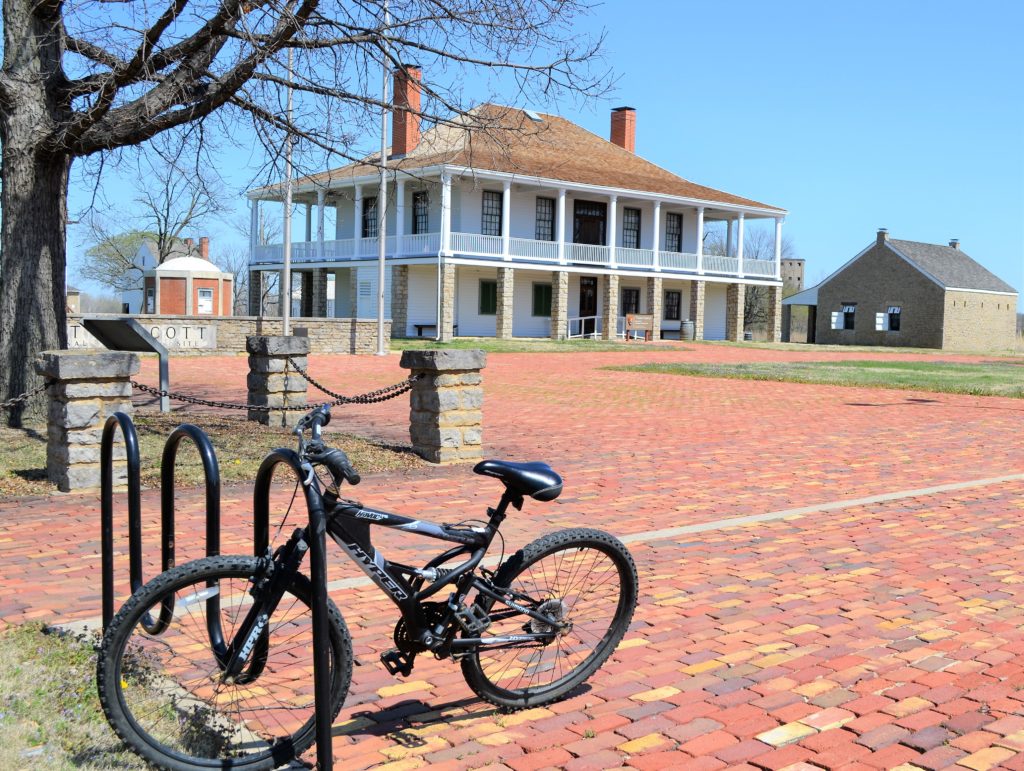
Labors and Leisure on the Frontier
Labor Day Weekend at Fort Scott
Fort Scott Kan. – Saturday, September 3 through Monday, September 5, 2022, Fort Scott National Historic Site will take you on an exploration of the labors and leisure on an 1840s frontier post. Labor Day weekend activities include artillery demonstrations, 1840s baseball, candle making, breadmaking, construction skill demonstrations, historic yard games, and a variety of interpretive programs. Visit with soldiers, and an officer and his wife and find out about the labors of the fort and the leisure activities. All programs are free and open to the public.
Saturday, September 3, 2022
10:00 am – Guided Tour
11:00 am – Artillery Demonstration
Noon – Beam Me Up: Historic Construction Demonstration
1:00 pm – Guided Tour
2:00 pm – Artillery Demonstration
3:00 pm – Saws and Scalpels: Frontier Medical Program
Sunday, September 4, 2022
10:00 am – Guided Tour
11:00 am – Artillery Demonstration
Noon – Hitting Home: Baseball on the Frontier
1:00 pm – Guided Tour
2:00 pm – Artillery Demonstration
3:00 pm – Let the Games Begin: Historic Games Program
Monday, September 5, 2022
10:00 am – Guided Tour
11:00 am – Artillery Demonstration
Noon – Small Arms Drill (Children’s’ Program)
1:00 pm – From the Crack Post of the Frontier, Construction Tour of Fort Scott
2:00 pm – Artillery Demonstration
3:00 pm – Beam Me Up: Historic Construction Demonstration
From April 1-October 31, Fort Scott National Historic Site, a unit of the National Park Service, is open for its summer hours of operation. The site exhibit areas and visitor center are open daily from 8 a.m. – 5 p.m. The park grounds are open daily from a half hour before sunrise until a half hour after sunset. To find out more or become involved in activities at the Fort, please contact the park at 620-223-0310 or visit our website at www.nps.gov/fosc.
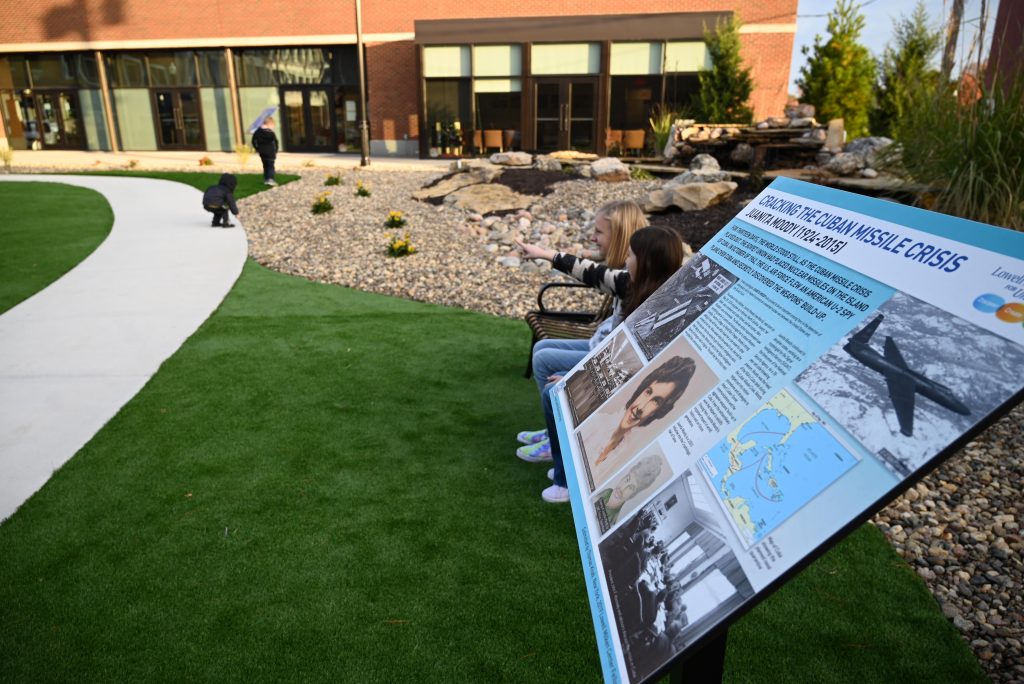
Lowell Milken Center Special Events
The Lowell Milken Center for Unsung Heroes will be celebrating two important milestone events on September 12-13, 2022. Those dates will mark the official Grand Opening of the Lowell Milken Park, as well as the commemoration of the 15th Anniversary of the Lowell Milken Center for Unsung Heroes. A Community Open House is scheduled for Monday, September 12th from 1:00 – 5:00 pm and Tuesday, September 13th from 10:00 am – 4:00 pm. The public is invited to view the new Unsung Hero exhibits, both in the beautiful Lowell Milken Park and in the Hall of Unsung Heroes.
Special events for the afternoon of Monday, September 12th, include the following four sessions with honored guests recognizing special Unsung Heroes:
1:00 pm – Family of WWII Navajo Code Talker Chester Nez
2:00 pm – Rwandan Rescuer Carl Wilkens
3:00 pm – Family of WWII Boat Developer Andrew Jackson Higgins
4:00 pm – Family of Astrogeologist Gene Shoemaker (whose ashes are buried on the moon)
Seating for the presentations is limited.
The Lowell Milken Center is a non-profit 501 © (3) that works with students and educators within a range of diverse academic disciplines, to develop projects focused on unsung heroes.

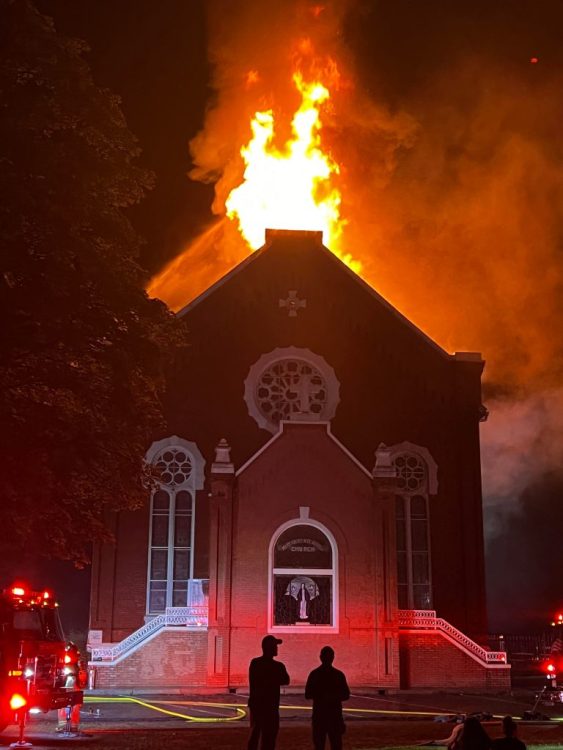
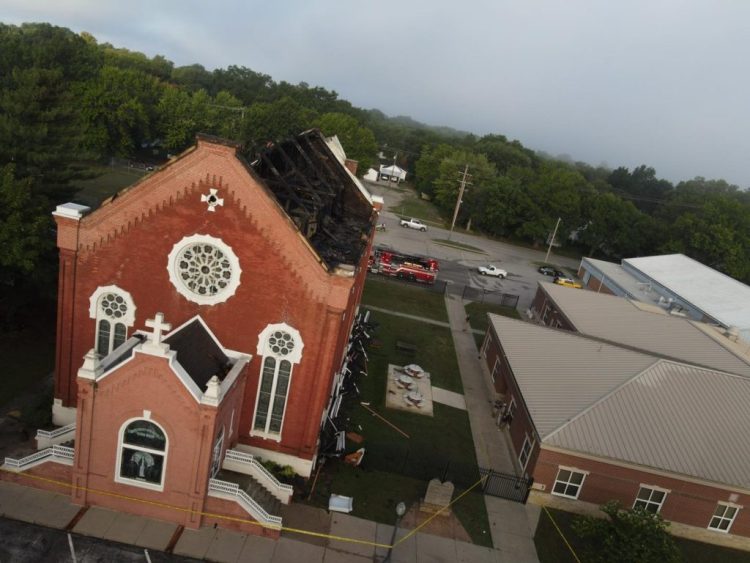
Mary Queen of Angels Catholic Church, 705 S. Holbrook, Fort Scott suffered extensive damage in a fire that started in late evening on August 29.
According to a press release from the FSFD, on Monday, August 29, 2022 at approximately 9:12 p.m. the Fort Scott Police Department and fire department, along with Bourbon County EMS responded to St. Mary’s Catholic Church in Fort Scott for a report of a fire.
When the units arrived the church was on fire with heavy smoke and flames emitting from the southeast corner of the structure.
The Fort Scott Fire Department, with assistance from Nevada Fire Department, Scott Township Fire Department, Bourbon County Rural District 3 Fire Department, and Arma Fire Department battled the blaze until the early morning hours today.
The cause of the fire is currently being investigated by the state fire marshal’s office, along with local fire investigators, according to the press release from Fire Chief Dave Bruner and the FSFD Public Information Office.
One Fort Scott Firefighter sustained a minor injury and he was treated and released from the Via Christi Emergency Department. No other injuries are known.
“Our hearts and prayers go out to the parishioners of St. Mary’s Church, and the members of our community who have been affected by this tragedy,” according to the release. “All official updates on this case will be posted to the Fort Scott Fire Department Facebook page, as well as the Facebook and Twitter accounts for the Fort Scott Police Department.”
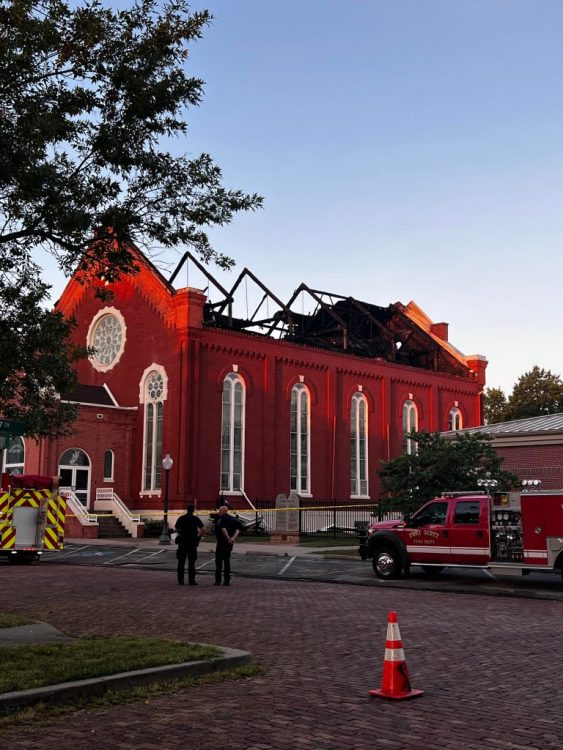
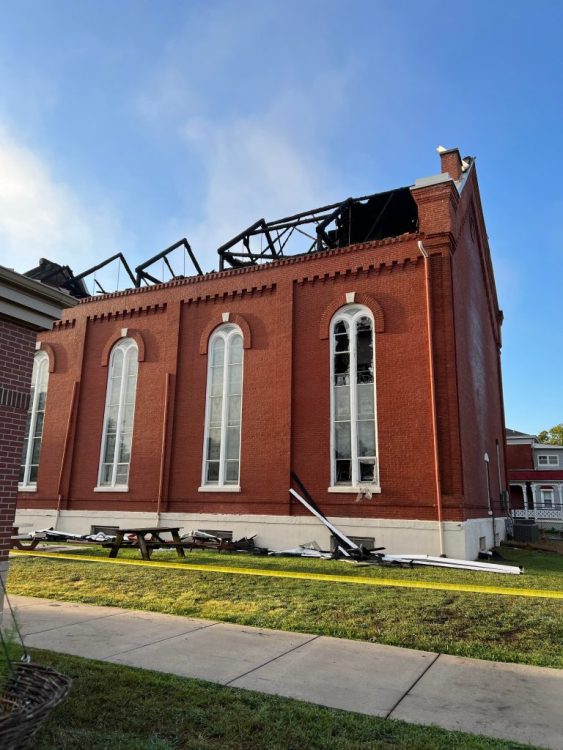


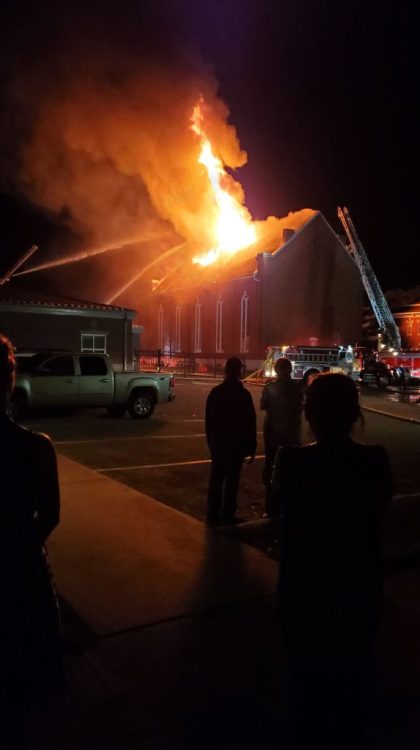
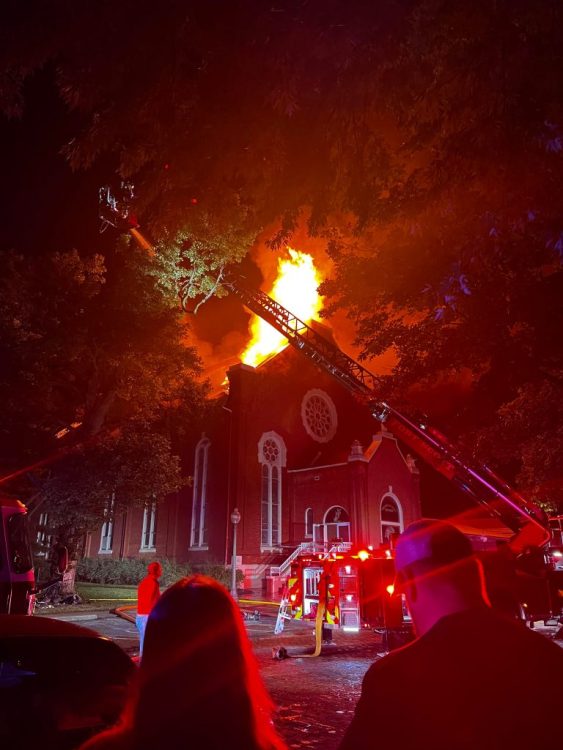
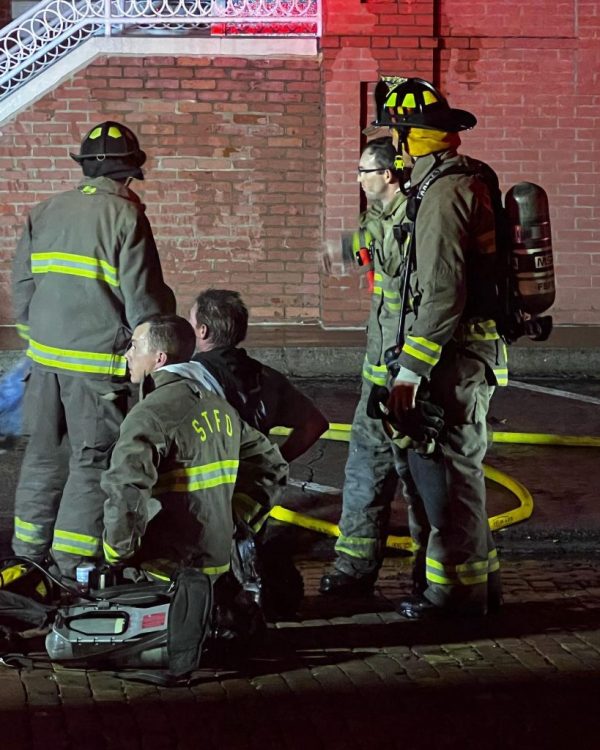

Ascension Via Christi Hospital’s trauma program recognized for quality
Ascension Via Christi Hospital in Pittsburg’s Level III Trauma Program, which treats patients who have critical injuries threatening life or limbs, was first accredited by the American College of Surgeons Committee on Trauma in 2008. Now, it has passed re-accreditation for another three years.
The program, which will turn 15 next year, was recognized for its quality, improvement, maturity and focus, as well as for its trauma leadership and outstanding relationship with regional EMS.
“A Level III Trauma Program accreditation designates our hospital as one that has resources and expertise to care for our community and neighbors when any trauma occurs,” says Brett Dunbar, DO, hospital surgeon . “As a trauma center, our team is committed to improving and providing evidence-based care through our involvement at the local level as well as at the state level.”
The ACS Trauma Survey is designed to help hospitals evaluate and improve trauma care as well as provide objective, external review of capability and performance. A Level III Trauma Center designation indicates that the hospital has demonstrated an ability to provide prompt assessment, resuscitation, surgery, intensive care and stabilization of injured patients and emergency operations.
This achievement allows Ascension Via Christi Hospital to continue to provide Southeast Kansas with quality care close to home and when it’s needed the most.
For more information about Ascension Via Christi Hospital in Pittsburg, go to ascension.org/pittsburgKS.
About Ascension Via Christi
In Kansas, Ascension Via Christi operates seven hospitals and 75 other sites of care and employs nearly 6,400 associates. Across the state, Ascension Via Christi provided nearly $89 million in community benefit and care of persons living in poverty in fiscal year 2021. Serving Kansas for more than 135 years, Ascension is a faith-based healthcare organization committed to delivering compassionate, personalized care to all, with special attention to persons living in poverty and those most vulnerable. Ascension is the leading non-profit and Catholic health system in the U.S., operating more than 2,600 sites of care – including 145 hospitals and more than 40 senior living facilities – in 19 states and the District of Columbia
Hosting My Annual Kansas Conservation Tour
Kansas Dairy Development in Deerfield
It was great to have so many people from across Kansas join me on this year’s Conservation Tour. This year, we were in Southeast Kansas and started the tour at Kansas Dairy Development (KDD) in Deerfield.

The purpose of this stop was to learn from KDD about the water conservation techniques they use to raise calves and run an efficient dairy farm. KDD has invested in energy free and overflow-free water tanks, and through these efforts, water consumption has dropped more than two gallons per head, per day across the facility. Thank you to Jason Shamburg, owner of KDD, for hosting us and for sharing his insight on sustainability and conservation of resources for our state.
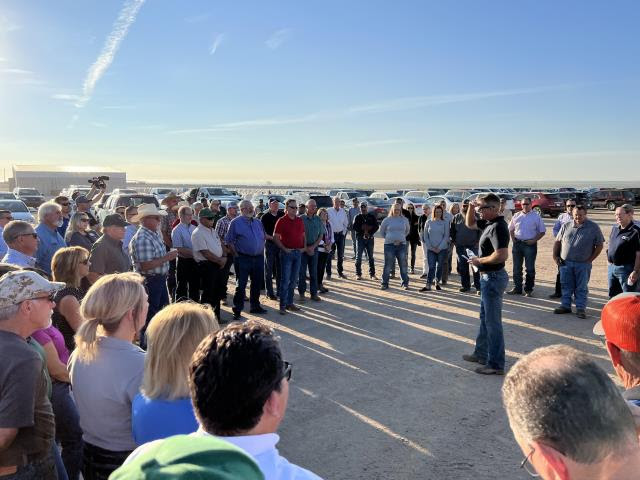
Knoll Brothers, Inc. in Garden City
Our second stop was at Knoll Brothers, Inc. in Garden City. Shane and Zack Knoll operate an irrigated farm where they grow wheat, corn and sorghum. As fourth-generation farmers, they understand the importance of sustainable farming practices so that their family farm can continue for generations to come. Thank you to Shane and Zach for hosting us and for sharing their expertise with us during my Conservation Tour.
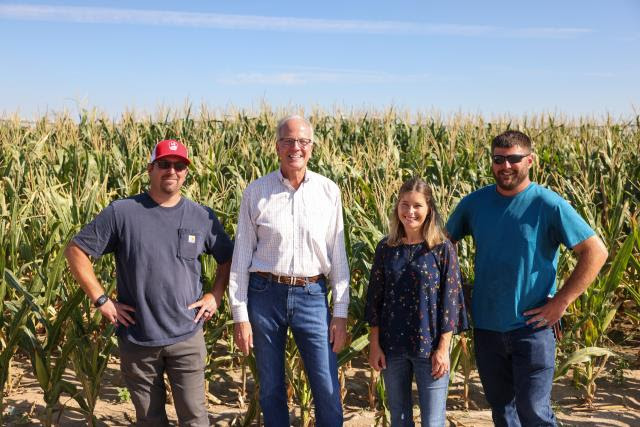
Circle Land & Cattle Corporation in Garden City
For the final stop, we visited Circle Land & Cattle Corporation in Garden City to learn about their water conservation methods to responsibly utilize water from the Ogallala Aquifer.
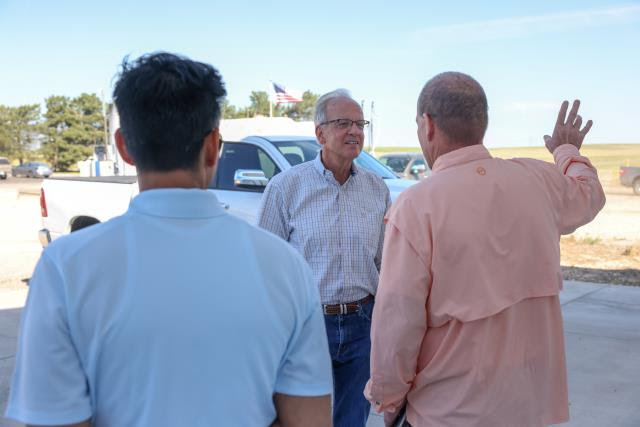
Circle Land & Cattle (CLC) was established in 1972 and was strategically developed with water pumped from the Ogallala Aquifer. As water in the Ogallala is declining, water conservation is a top priority.

CLC’s conservation efforts help support Garden City’s water supply enabling the city to continue to grow and meet the water needs of the community. Thank you to Circle Land & Cattle for hosting us and sharing insight into their success with sustainable water conservation.
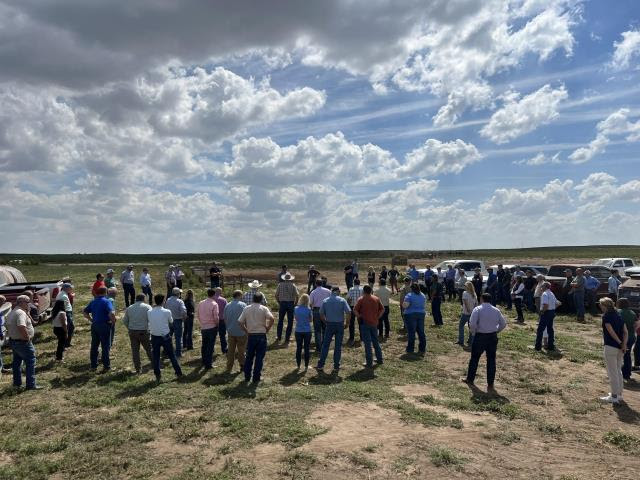
On Sunday evening, prior to my 16th Annual Conservation Tour, I joined local leaders, education professionals, scientists and area agricultural producers to learn about and discuss the state of the Ogallala aquifer. We heard from industry experts on ways to mitigate depletion of the water supply and efforts to recharge the aquifer that is vital to the economy of Southwest Kansas.
Goodtimes Grill
Thank you as well to Goodtimes Grill from Copeland for serving us lunch during the final stop on my Conservation Tour. I first ate Goodtimes Grill during Dodge City Days and was excited they could serve more than 100 of us during the tour.
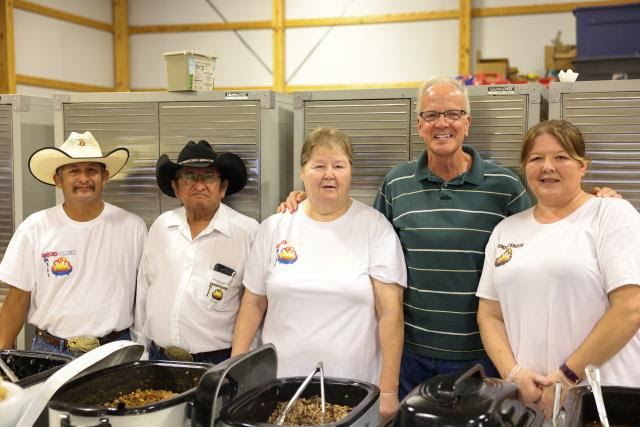
Hosting U.S. Army Chief of Staff General McConville in Kansas
On Thursday, I hosted General James McConville, the 40th Chief of Staff of the U.S. Army, at Fort Leavenworth and Fort Riley. At Fort Leavenworth, we spoke to soldiers participating in the Army’s Pre-Command Course, a training program created to help future Company Commanders and First Sergeants prepare for command. These soldiers are the future leaders of our Army, and they display true commitment to service of our country.
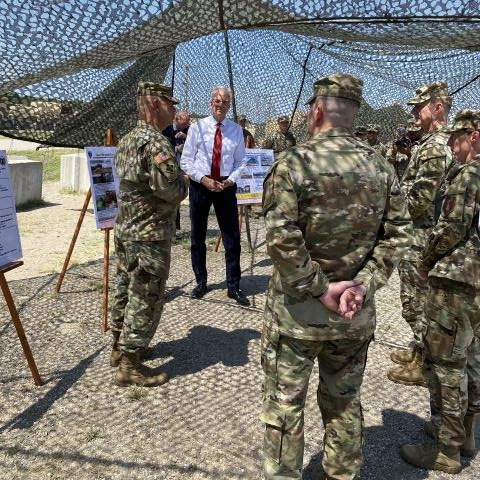
During our visit to Fort Riley, we met with soldiers and saw some of the vital training capabilities this base offers. While Fort Riley has projected growth over the next several years, for further gains to be made, we have to overcome the current recruiting crisis. We are in the most challenging recruiting environment since the creation of the all-volunteer force. As a member of the Senate Appropriations Committee, I will continue to work with the Army to make certain they have the resources needed to address this crisis. Our visit to Fort Riley concluded with a chance to visit with local leaders in the Fort Riley community. Support from the community is critical in these efforts to maintain a strong national defense, and we are grateful to these Kansans for making the Fort Riley community a great place for its soldiers and their families to call home.
.jpg)
Thank you to General McConville for his leadership and for taking the time to visit these bases in Kansas, which continue to be a source of pride for our state. Special thanks as well to General Theodore Martin, Fort Leavenworth Commanding General and Fort Riley First Infantry Division Deputy Commanding General Niave Knell for hosting us, and to all of our soldiers and their families who sacrifice to defend and serve our great country.
.jpg)
Monica Bassett – 2022 Army Spouse of the Year
While at Fort Riley, I met Monica Bassett who was named the 2022 Army Spouse of the Year. A military spouse of eight years and mom of two, Monica is currently stationed at Fort Riley with her husband, Major Gregory Bassett. It was an honor to meet her and speak with her about the work she is doing at Fort Riley to serve our soldiers, their families and the surrounding local community.
Military service is family service. Thank you to Monica for her sacrifice, service and dedication to our military community.
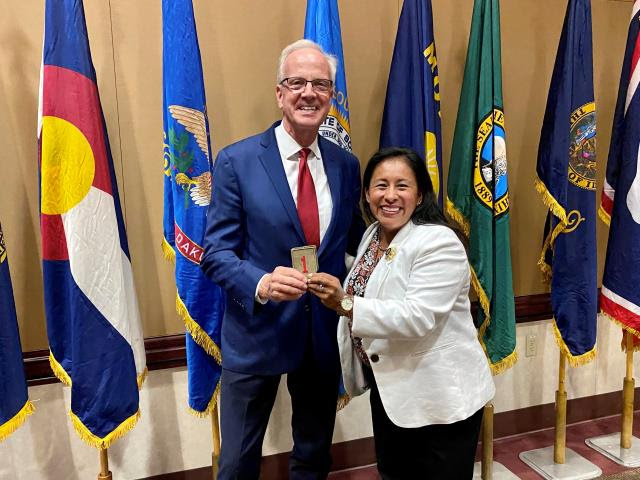
Showcasing Kansas’ Contribution to Space
We are approaching the dawn of a new era in space. In the coming days, NASA’s Artemis I mission will launch on the first Space Launch System (SLS) rocket from Kennedy Space Center. Artemis I is an uncrewed test flight of NASA’s Artemis program to return astronauts to the moon and beyond.
I recently hosted the head of NASA in Kansas to showcase our state’s contributions to NASA and the Artemis mission. Watch the video below to learn more about Administrator Nelson’s visit to Kansas.
President Biden’s Student Loan Announcement
President Biden’s $300 billion plan to cancel student loans will fuel inflation and do nothing to actually lower the cost of higher education. There is no doubt that times are hard for many Americans, but canceling student loan debt is unfair to the millions of Americans who worked their way through college, chose careers that didn’t require a college degree, saved money and paid off their own debt or enlisted in the military. Forcing Kansans, who worked hard and played by the rules, to pay other people’s debt is not right.
Visiting Humboldt
On Tuesday, I was in Humboldt and met with a number of folks including Mayor Nobby Davis and City Administrator Cole Herder. I also toured the downtown square with Paul and Alana Cloutier of A Bolder Humboldt who moved to Kansas from California about five years ago. This organization was established to help bolster the community by connecting with large employers and identifying businesses to recruit to the area. They also help rehabilitate storefronts in the downtown district, which is now home to a confectionery store, a coffee shop, several restaurants, clothing boutiques and video golf.
Humboldt’s efforts go beyond their downtown and are one of the reasons why the community has been featured in newspapers and magazines across the nation. Thank you to everyone who welcomed us into their stores and stopped for conversation.
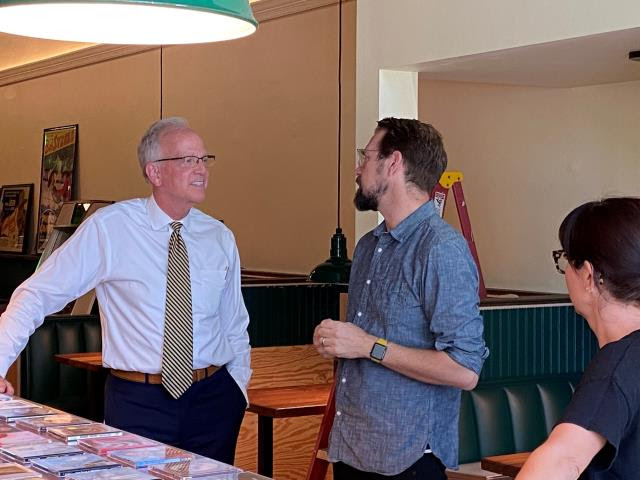
Touring Orizon Aerostructures in Chanute
This week, I visited Orizon Aerostructures for a tour of their assembly plant in Chanute and to learn more about the work they do manufacturing aviation parts here in the heartland. Founded in 2016, this company services commercial, defense and general aviation. They currently have six locations, and the plant in Chanute is the newest facility.
In 2021, Blue Origin announced a multi-year partnership with Orizon to work on Blue Origin’s engine program and their reusable heavy-lift orbital launch vehicle. Because of the success they have seen with their southeast Kansas location, and the strong work ethic of Kansans who work in this facility, Orizon is looking to double its size. Currently, there are 378 employees working at the Chanute location.
It was great to hear about the continued efforts by Orizon to make certain aviation parts are manufactured domestically and specifically, right here in Kansas. Thank you to Orizon CEO Charlie Newell and President Henry Newell, as well as Charlie’s son Rick Newell, for hosting me during this visit. Thanks as well to Todd Newman, Chanute City Manager, Matt Godinez, Chanute Economic Development Director and Director of the SEK Regional Planning Commission and Jane Brophy, Chanute Area Chamber of Commerce Executive Director, for joining us.

Visiting KwiKom Communications in Iola
This week, I visited KwiKom Communications in Iola to learn from them about the work they do to provide Internet access to Kansans. First opened in 2004, KwiKom Communications provides high speed Internet coverage to 45 counties in Kansas, Missouri and Oklahoma. One of their first business opportunities was helping grain elevators access the Internet to check commodity information. Today, they continue to work to help bring broadband access to rural areas of Kansas and to work with other providers to make certain that our Kansas communities are connected through reliable, high-speed Internet coverage. Thanks to John Terry of KwiKom Communications for hosting me during this visit and to Jonathan Goering, Economic Development Director for Thrive Allen County, for joining.
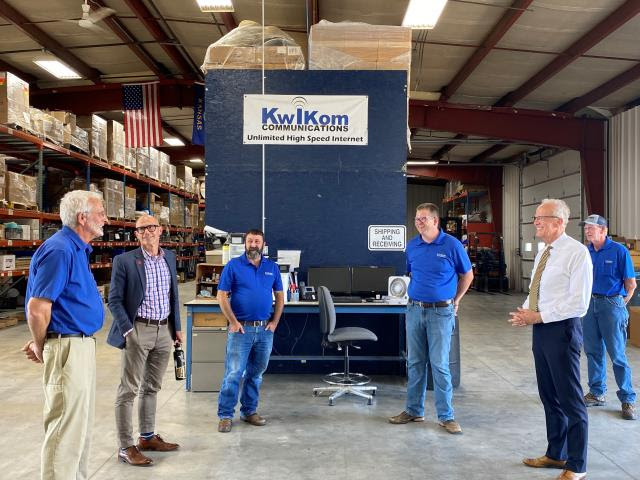
Attending the Manhattan Chamber’s Established Business Leaders Lunch
On Thursday, I attended the Manhattan Area Chamber of Commerce Established Leaders lunch group. It was great to join this group to discuss current issues facing the local Manhattan community. I expressed my shared goals of supporting Fort Riley, Kansas State University, the National Bio and Agro-Defense Facility (NBAF) and other economic development projects like the Scorpion commitment. The Manhattan Chamber continues to be a driving leader in the community, supporting local businesses and promoting economic growth for the area. Thank you to Jason Smith, Chamber CEO, for the opportunity to stop by and visit with chamber members.
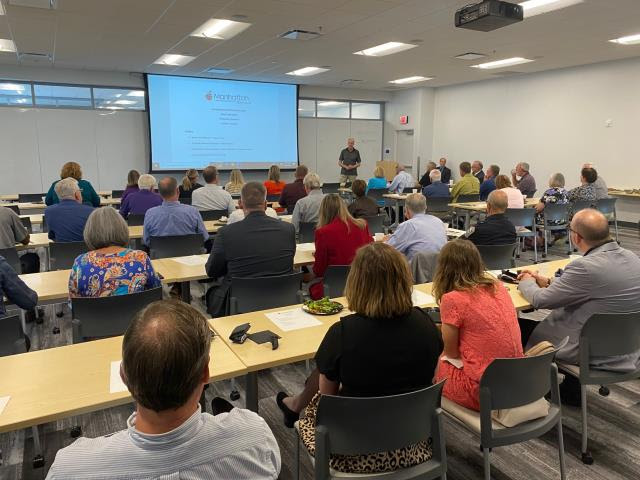
Touring Vortex Global in Salina
I recently visited Vortex Global in Salina, a family-owned company that employs more than 400 people in the community. The components produced by Vortex are used in the manufacturing process of food and beverages, plastics and chemicals, minerals and metal and pharmaceuticals. During this visit, I was impressed by the work ethic, dedication and culture of this organization, as well as the wide scope of equipment produced right here in the heart of Kansas. Thank you to Vortex CEO Travis Young for hosting me during this visit and for investing in the Salina community.
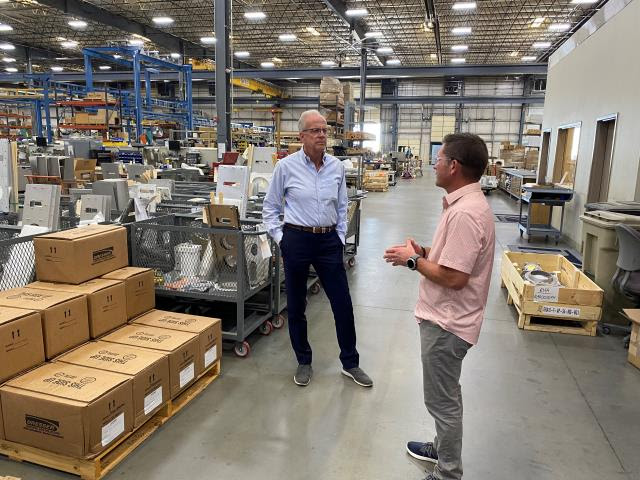
Attending the Alton Summer Jubilee Parade
It was great to be at the Alton Summer Jubilee Parade on Saturday and see familiar faces and speak with Kansans about the issues that matter to them. I also enjoyed the chance to talk with several members of the Alton American Legion during the parade.
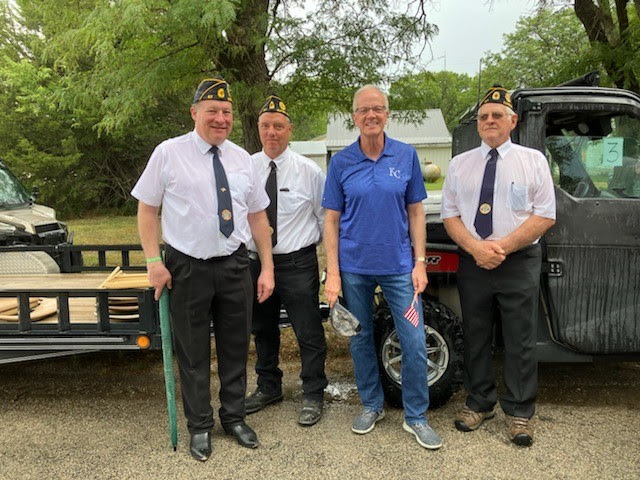
Visiting VFW Post #8873 in Stockton
On Saturday, I also had lunch at the Veterans of Foreign Wars (VFW) Post #8873 in Stockton. It is always an honor to spend time with those who have served our nation, and I am grateful to each of these veterans for the sacrifices they made to protect and defend our country.
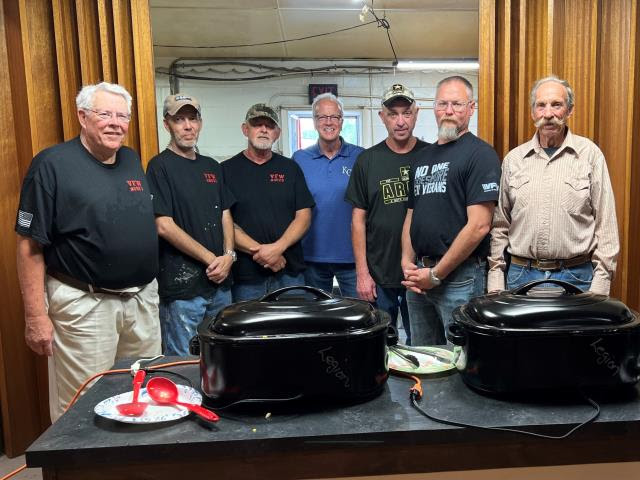
![]()
Ft. Scott Lighthouse Encouraging Unity
Fort Scott Lighthouse welcomes Rachel French, the leader of a local interdenominational Christian women’s group, IF: Fort Scott. IF: Fort Scott promotes unity throughout the Body of Christ in Fort Scott and surrounding areas.
They host weekly Bible studies and two large gatherings throughout the year. The studies and events are focused on unity, discipleship, and community.
IF will be hosting their next Gathering on Saturday, October 22. Tickets for the event go on sale Saturday, September 10, and can be purchased at https://iffortscott.wixsite.com.
Rachel is a Jesus Follower, wife to Daniel plus a mom to two teen girls, Grace and Sophie, an advocate for unity within the Body of Christ, a member of Mary Queen of Angels Catholic Church and a believer in local community stewardship.
Guests are welcome Thursday, Sept. 8 at 6:30 p.m. This is an interdenominational ministry opportunity for men, women, and youth. The goal of Aglow International is: Every nation touched, every heart changed.
Fort Scott Aglow Lighthouse meets the second Thursday of each month at the conference room of Fort Scott Inn, 101 State Street.
KCC grants NextEra public utility status to build a 94-mile Wolf
Creek to Blackberry transmission line, but with added conditions
TOPEKA – In a special business meeting August 29, the Kansas Corporation Commission (KCC) granted a certificate of convenience and necessity (CCN) to NextEra Energy Transmission Southwest, LLC, enabling the company to do business as a transmission only public utility in the State. The company filed an application for the certificate in February in order to construct a 94-mile, 345 kV transmission line from Wolf Creek to the Blackberry Substation, less than one mile over the state line in Southwest Missouri. The proposed line runs through five Kansas counties: Coffey, Anderson, Allen, Bourbon and Crawford. The final route has not yet been approved by the Commission.
The Wolf Creek to Blackberry project was identified by the Southwest Power Pool (SPP) as a necessary economic project to increase the transmission capability and relieve congestion from western Kansas east to SPP load centers. SPP is a regional transmission organization (RTO) mandated by the Federal Energy Regulatory Commission (FERC) to ensure reliable supplies of power, adequate transmission infrastructure, and competitive wholesale prices on behalf of its members. SPP serves 17 states, including Kansas.
In issuing today’s order, Commissioners agreed the project provides benefits for Kansans.
“Based on the testimony received, the Commission finds that the Transmission Project will have a beneficial effect on customers by lowering overall energy costs, removing inefficiency, relieving transmission congestion and improving the reliability of the transmission system.”
Justin Grady, KCC Chief of Revenue Requirements, Cost of Service and Finance testified that Kansas customers could see an increase of $0.04 to $0.05 per month to cover the cost of the line beginning in 2025, but when the benefits of the project are considered, they should see a reduction of $4 to $7 for every dollar spent on the line over its 40 year operating life.
Grady also addressed misconceptions about the financing and purpose of the transmission line. He said the cost of the line will be allocated equally across the entire 14 state SPP region based on transmission customer load share. Kansas is paying 16.5% of the cost.
As for concerns that the line will be shipping nuclear or wind power out of Kansas to states outside of the SPP footprint, Grady said there is no evidence to support that.
While granting the certificate, the Commission imposed additional requirements and conditions on NextEra designed to protect ratepayers and to explore ways to minimize the impact of landowners along the proposed route. One of the conditions calls for NextEra to evaluate the feasibility of double circuiting the line with an existing 25-mile Evergy 161 kV transmission line and report back before a line siting application can be filed with the Commission. A double circuit line has two independent circuits on the same structure eliminating the need for an additional easement and reduces structure costs.
“The public interest of Kansans, especially including the landowners that would be affected along this portion of the preliminary route of the line, will not be served if this issue is not comprehensively reviewed by all parties before NEET Southwest files its line siting request with the Commission. To reiterate, failure to earnestly and completely review the double circuit option may result in a proposed route that the Commission cannot approve as reasonable, which the Commission wishes to avoid.”
Today’s order can be viewed here.
A recording of today’s Business Meeting featuring Commissioner comments on the order, is available on the KCC YouTube channel.
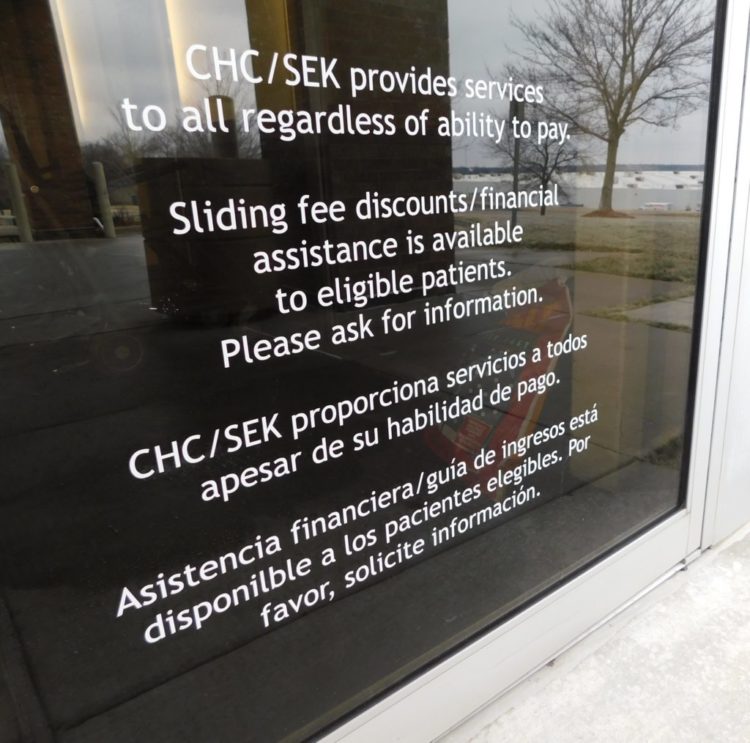
Community Health Center of Southeast Kansas (CHC/SEK) clinics has received the recently authorized Novavax vaccine as the latest tool in the fight against COVID-19. To date, the Baxter Springs, Coffeyville, Columbus, Fort Scott, Iola, Parsons, Pittsburg, and Pittsburg South clinics have received doses. Vaccinations are available on a walk-in basis, or by appointment. There is no out-of-pocket cost to receive the vaccine at CHC/SEK.
The Novavax COVID-19 vaccine is the latest authorized and recommended vaccine to prevent severe illness, hospitalization and death caused by the virus. Novavax is manufactured using a familiar type of protein-based vaccine technology that has been used for more than 30 years in shots that help prevent diseases like shingles, hepatitis B, the flu and other illnesses.
The U.S. Food and Drug Administration issued an emergency use authorization (EUA) for the Novavax COVID-19 Vaccine on July 13 for the prevention of COVID-19 caused by severe acute respiratory syndrome coronavirus 2 (SARS-CoV-2) in individuals 12 years of age and older who have not received a primary series of a COVID-19 vaccine previously.
Access to multiple types of safe and effective COVID-19 vaccines authorized by the FDA and recommended by the CDC gives people more options and flexibility to choose their vaccine.
The Novavax vaccine is given in a two-dose primary series, with a second dose administered between three-to-eight weeks after the first.
Neither a booster nor a third dose is authorized at this time.
“We now have another tool to manage COVID-19,” said Linda Bean, D.O., FAAFP, Chief Clinical Officer at CHC/SEK. “Novavax provides another option for a safe, effective and free vaccine. With the BA.5 variant continuing to spread, now is the best time to get a vaccine if you haven’t already.”
For more information about COVID-19 vaccines, testing and treatments, visit https://www.cdc.gov/
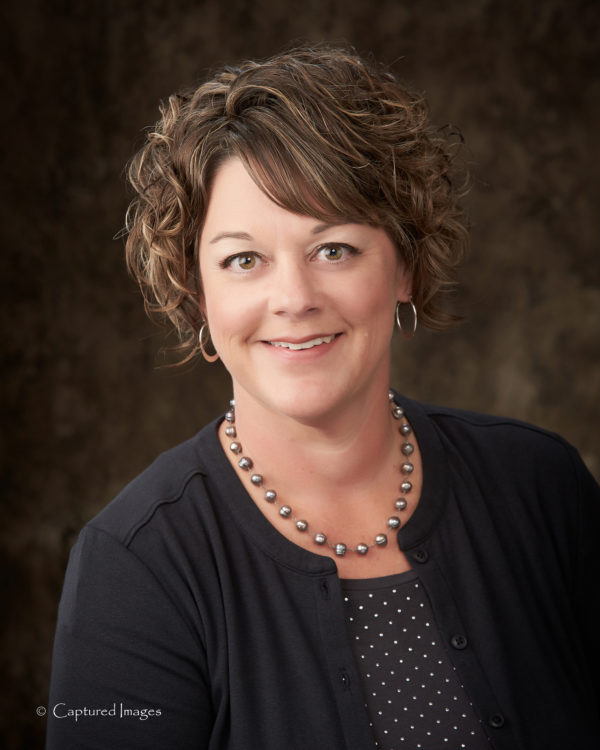
Rainfall across the Southwind District has been spotty at best for several weeks now. The US Drought Monitor was recently updated on August 25th. It now has most of the area in a D2 intensity – classified as a severe drought. Unfortunately, the long-range projection doesn’t show the drought breaking anytime soon. As Kansans, however, we all know that could change and we could go from a drought to a flood in the matter of a few days! I’m not hoping for rainfall like that, but several inches in the up-coming weeks would be welcome.
Heat and drought stress has taken a toll on newly planted trees and shrubs this year. Any time we plant a new tree, it will go through a period of “transplant shock.” Just like the name implies, this is a period of stress on the new plant as it tries to adapt to its new environment. Many times, new trees will drop almost all of their leaves the first year planted. Due to the heat and lack of rainfall this year, it has been more severe. Obviously, this is quite concerning to homeowners. The good news is that in most instances, the newly planted tree will be fine and leaf out the following spring.
However, as we continue to remain in a drought situation, careful attention needs to be paid to any new trees or shrubs that were planted this spring. Here are watering recommendations:
As for shrubs, since they are smaller, they will require less water. Water enough to thoroughly moisten the entire rootball, down to a depth of 8 inches – about once a week.
To reduce the stress on our older, mature trees, concentrate on good watering – not just a quick shot here and there. As long as we remain in a drought, water older trees to a depth of at least 10 inches. Make certain to water out beyond the drip line. Avoid watering at the base of the trunk as the absorbing roots are farther out. Check the watering depth by pushing a screwdriver or metal rod into the soil. It will stop when it reaches dry soil.
If you have concerns about the health of a tree or shrub, please feel free to contact me. I am available to make home visits if needed.
Krista Harding is a K-State Research and Extension Agricultural agent assigned to Southwind District. She may be reached at [email protected] or 620-244-3826.
K-State Research and Extension is an equal opportunity provider and employer.